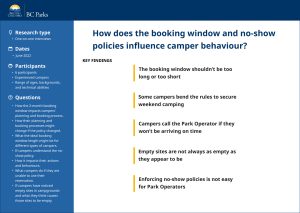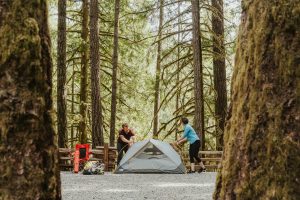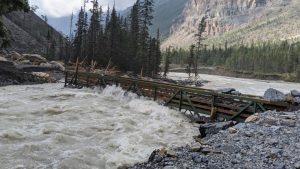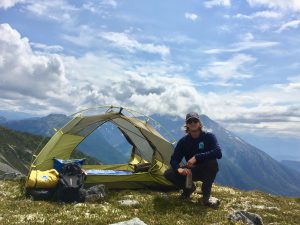Everyone belongs in nature: A conversation with Power To Be
Categories:
Power To Be is a non-profit organization that creates access to nature for youth, families, and adults living with cognitive, physical, financial, and social barriers. They are one of the many organizations we are lucky to partner with and have challenged and supported us over the years to do more to make BC Parks more accessible and inclusive to all. We sat down with Jasmine, Community Engagement Specialist at Power To Be, to learn more about the organization, what motivates Jasmine in her role, and the power of partnership.

Hi Jasmine! Tell me about Power To Be, how did it come to be?
Power To Be began in 1998 with an idea that grew into a community, centered around removing barriers, connecting participants to adventures and opportunities, and collectively redefining our definition of ability. Based in Victoria and Vancouver, we are a non-profit organization that believes everyone belongs in nature. From hiking and kayaking, to camping and snowshoeing, our programs redefine courage, hope, inclusion, and ability.
Some of us at BC Parks were fortunate to recently visit you at your beautiful new building on Prospect Lake. Can you tell us more about it?
Yes, we’re now in our new home base at Prospect Lake. The Steele family has generously leased us 78 acres of land for $1 a year for the next 25 years and architect Christine Lintott, Campbell Construction Ltd., and our donors partnered to create a new building that we opened in September. As an important part of creating an inclusive, universally designed facility, we integrated elements to respect gender inclusivity, stimuli sensitivities and limited mobilities. We wanted a place for our organization to put down roots and become an anchor within the community. With this new site, we can give back by creating a space where our community can come together to learn, innovate, and inspire others to explore the outdoors.
What motivates you in your role as Community Engagement Specialist?
I am passionate about having community conversations. I enjoy bringing diverse groups together to share information and resources with a focus on inclusion, accessibility, and diversity in nature. I get to listen to community needs, provide on the ground input, and advocate for inclusive community offerings, independence, and participation. Through collaboration we facilitate knowledge sharing workshops, community engagement and impact that stretches beyond just the Power To Be community.
Is there an achievement or milestone from Power to Be that you are most proud of?
I was introduced to Power To Be as a participant following a motor vehicle accident in 2003. With a high-level spinal cord injury, I never thought that getting back into the outdoors would be possible for me. A lot felt like it was instantly gone: the water sports that I loved, backpacking and camping on the trails, and feeling the most powerful emotions that come when you are alone in this great being called nature.
My first program with Power To Be was at a local beach in Victoria. I was sure that they wouldn’t be able to get me into a kayak, never mind out on the water paddling. After one hour of transferring and adjusting to find a balance between my emotional and physical comfort and the risk associated with a new activity in a new body, we were pushed off the beach into the water for what would be my first of many more ocean kayak adventures. Over the years, with the help of Power To Be, I got my confidence back, regained a healthy sense of adventure, and feel most myself in a quiet forest listening to the sounds of birds and critters, or on the water with the fog rolling in and the water calm as ice.
I am most proud of the thousands upon thousands of stories that participants can tell just like mine because of the good work that Power To Be has done as we enter our 25th year of programming.

“Over the years, with the help of Power To Be, I got my confidence back, regained a healthy sense of adventure, and feel most myself in a quiet forest listening to the sounds of birds and critters, or on the water with the fog rolling in and the water calm as ice.” – Jasmine
What is the biggest challenge you’re currently facing in your work?
There is so much need in the communities that we serve, no one entity can solve the many complex issues alone. I feel a real responsibility to nurture effective partnerships that leverage the strengths of each partner and apply it strategically to the issue at hand. It might take more work, and it might take longer, but strong partnerships build the relationships, shared understanding, and collective focus to make lasting progress.
Why do you think it’s important for BC Parks and Power To Be to work together as partners?
Working together as partners allows us to share skills, strengths, and perspectives so that we work towards a more inviting and approachable park experience for everyone. Our partnership is based on meeting people’s needs and the fact that the individual with the barrier is the expert of their own experience. Just as nature adapts, so must we.
Why do you think a strong focus on accessibility and inclusion is important in BC Parks?
Being in nature has multiple benefits including improving how we feel, how we learn, recognizing the importance of protecting the environment, and seeing first-hand how nature is a place that is accepting to all. BC Parks and organizations like Power To Be see all people having the right to access nature, and by focusing on accessibility and inclusion in parks, whether it’s through facilities, transportation to parks, or other barriers, we can create more access for everyone.




